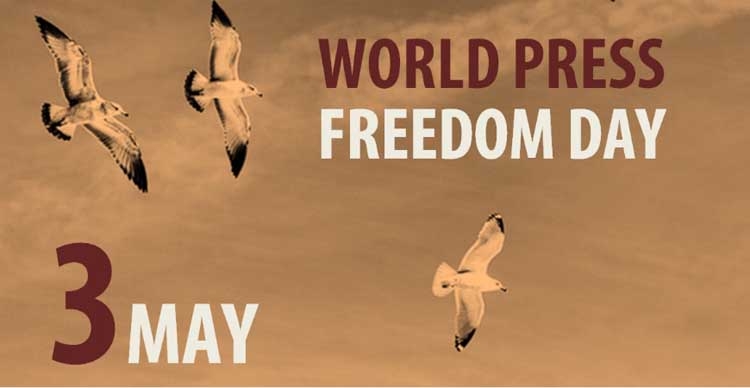SALEEM SAMAD

The UNESCO declares 3rd May as World Press Freedom Day and is a reminder to governments of the need to respect their commitment to press freedom and is also a day of reflection among media professionals about issues of press freedom and professional ethics.
Meanwhile during first 30-days of lockdown, since 26 March, the journalists and citizen-journalists are frequently targeted by state and non-state actors while reporting in social distancing, which the media rights defenders deemed as a serious threat to freedom of expression.
When Prime Minister Sheikh Hasina took an effort to scale-up food aid for the disadvantaged population in response to the nationwide shutdown, the media organizations, journalists and whistleblowers had to take the brunt of vengeance by local leaders and government officials including the police during the 30 days of lockdown.
Nearly twenty journalists were attacked, intimidated, harassed, or arrested for reporting on pilferage of food aid meant for poor people, who are facing extreme hardship during the lockdown.
The Forum for Freedom of Expression, Bangladesh (FExB), a network of media rights defenders expressed deep concern over series of violence, intimidation, and judicial harassment of journalists and news organisations during the lockdown.
The platform states that Thakurgaon district is the worst place for journalism in the country after six journalists were subjected to judicial harassment within a week.
Two editors, Toufique Imrose Khalidi of bdnews24.com, Mohiuddin Sarker of jagonews24.com along with three other local journalists were accused under draconian Digital Security Act.
After ten days of publication of news in two news portals on misappropriation of open market sale (OMS) rice, the Baliadangi Upazila's Swechchhasebak League, also a local ruling party leader Mominul Islam filed a case against the journalists.
In a separate case, police sued Al Mamun, a local journalist in Thakurgaon under notorious cybersecurity laws for criticising the district civil administration in Facebook for its failure to take effective measures to contain the spread of coronavirus during the lockdown.
Another journalist in Thakurgaon, Abdul Latif Litu, a correspondent of Bangladesh Pratidin was assaulted by police at a check post during the lockdown.
Sagor Chowdhury, an editor of a local news portal in Borhanduddin Upazila, Bhola posted a video on Facebook on embezzlement of food aid which angered the son of Jashim Uddin Hyder, president of Borhanuddin Upazila Awami League and also chairman of Boro Manika Union Parishad.
However, Borhanuddin Upazila police arrested the perpetrator Nabil Hyder, a member of the Chattra League of Dhaka University who posted a video on the Facebook assaulting Sagor Chowdhury.
In Habiganj, three journalists Shah Sultan Ahmed, a local journalist of Protidiner Sangbad, Mujibur Rahman, correspondent of Dainik Amar Sangbad and Bulbul Ahmed, correspondent of private TV Channel-S were attacked with a cricket bat by Mahibur Rahman Harun, chairman of Aushkandi Union Parishad.
Sultan posted a video on Facebook which revealed that the local Aushkandi Union Parishad was distributing 5 kg of rice instead of allocation of 10 kg for each ultra-poor fishing community.
Nasir Uddin Rocky, a staff reporter of Dainik Jugantor in Chittagong was crossing a check-post in a motorbike. The police arrested the journalist but was released unconditionally.
A similar incident at a check post in Bogura, police assaulted two journalists Majedur Rahman, correspondent of Shomoy TV, and Shahjahan Ali of Ekattor TV. The journalists were dragged to the police station in handcuff and were released without charges.
In the capital Dhaka, police arrested Golam Sarwar Pintu, journalist of Dainik Bangladesher Alo after a Dhaka city councillor of Ward 38 filed a case under notorious Digital Security Act with Badda Police Station.
Pintu's crime was the publication of news regarding angry urban-poor community held protest demanding food aid during the lockdown.
In a check-post in Dhaka police assaulted Tuhin Howlader, court correspondent of Bangladesh Pratidin.
Again in the southern district of Barishal, Bangla Vision TV correspondent Kamal Hossain was attacked by hooligans when he tried to cover a gathering - in violation of the lockdown.
Rezwan Karim Sabbir, a Jaintapur Upazila correspondent of Dainik Nayadiganta was hospitalized at Sylhet Medical College with serious head injuries after he was attacked by Abul Hasim, who was annoyed by an article in which the journalist had reported a local coronavirus case.
Not far from the capital, Chairman of Amirganj Union Parishad in Narsingdi mercilessly attacked Baten Biplob, Senior Crime Reporter of SATV and Sajal Bhuiyan, Narsingdi correspondent of SATV.
Baten Biplob in his Facebook post described the barbaric attack on journalist Sajal Bhuiyan who was profusely bleeding and crying in pain.
Meanwhile, international media rights organisation Reporters Without Borders (RSF) has also expressed alarm in the increase of violence and judicial harassment of journalists trying to cover coronavirus-related issues in Bangladesh in the month since a general lockdown was imposed on the population.
First published in The Asian Age, 05 May 2020
Saleem Samad, is an independent journalist, media rights defender, recipient of Ashoka Fellow (USA) and Hellman-Hammett Award. Twitter @saleemsamad, Email:saleemsamad@hotmail.com

No comments:
Post a Comment